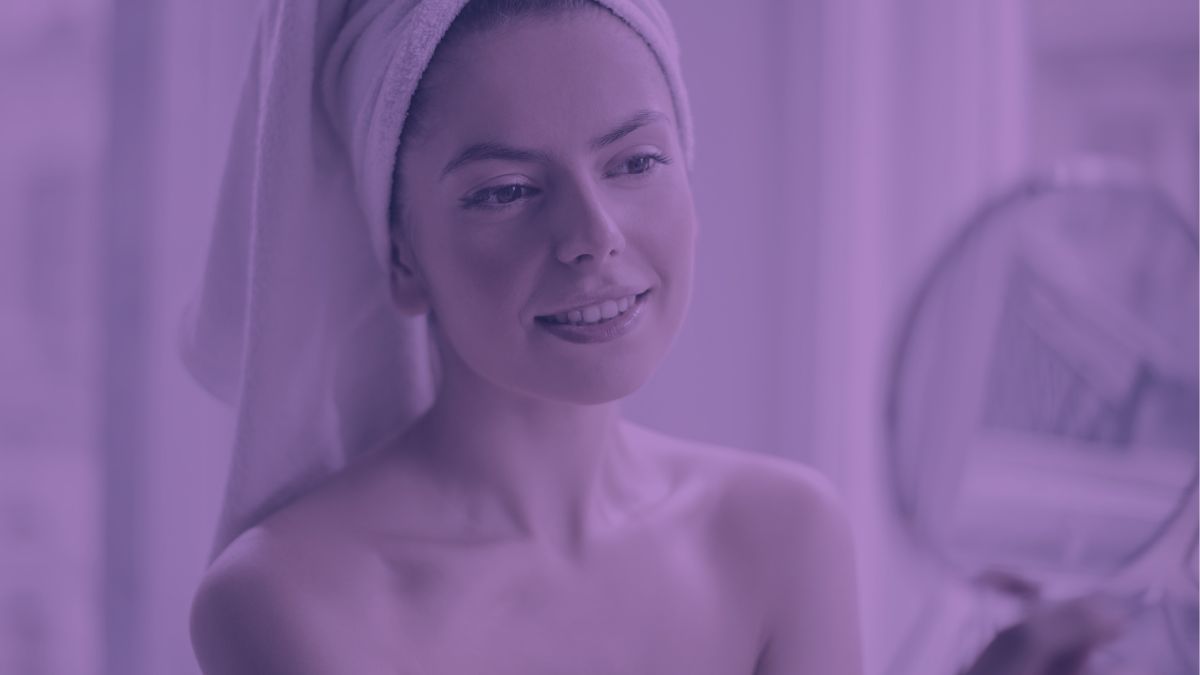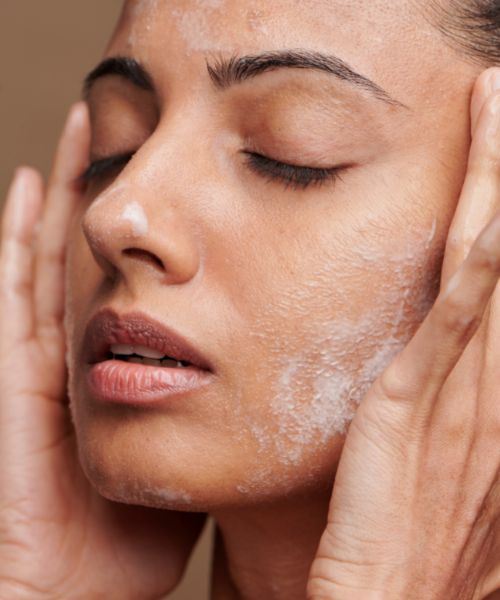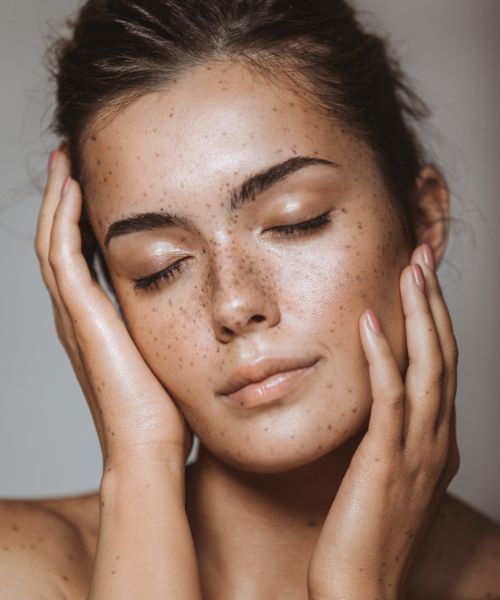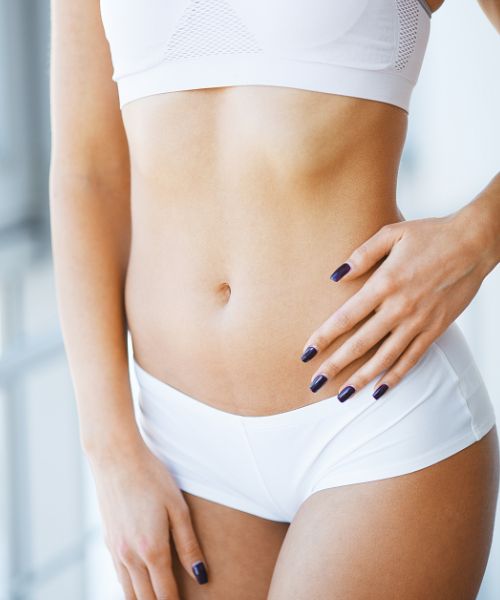Accutane is an intense treatment that can be especially challenging during the first month.
This is because experiencing sudden changes in your skin, body, and even your mood can be overwhelming, so it’s important to remember to be gentle with yourself – both physically and mentally.
Therefore, in this article, we’ll cover everything you need to know about Accutane, from what it is and how it works to tips that will help you make it through your first month on Accutane in the most comfortable way possible.

What is Accutane and How Does it Work?
Accutane is the brand name for the medication known as isotretinoin, an oral medication used to treat severe acne on the face and body.
It is also commonly prescribed to people whose acne has resisted previous treatments, such as benzoyl peroxide, adapalene, and antibiotics, as well as those dealing with severe acne in larger areas such as the chest and back.
Accutane inhibits the function of the oil-producing glands by reducing the gland’s size, thus reducing the amount of oil produced and essentially reducing acne since acne is caused by the buildup of oil in the pores that has led to bacteria overgrowth.
However, this action, although beneficial for aggressive bacteria and severe acne, is known to bring some unpleasant side effects.
The Side Effects of Taking Accutane
The most common side effects of taking Accutane include dry skin, chapped lips, and dry eyes.
Additionally, sometimes, people that are going through a long course of Accutane can experience joint pain, stomach aches, headaches, and hair loss, but these are rarer side effects that don’t happen to most people.
Finally, many people say that those taking Accutane are also at a higher risk of developing depression, suicidal thoughts, and other mental health issues; however, the research supporting this is still lacking.
Is The First Month of Accutane The Worst?
Things can be challenging during the first month of Accutane, as this is when you will start to experience its potential side effects, which is not something you are used to, so by default, it is going to feel strange, which can be a bit daunting and can definitely qualify as the “worst.”
Additionally, the first month of Accutane likely won’t yield any significant changes for the better and will, in fact, look like your skin is getting worse, so with the side effects and seemingly no results or worsening of the situation, you may definitely have days where you will ask yourself if the treatment is worth it.
However, Accutane, although the nuclear weapon for acne, isn’t an overnight miracle drug; this treatment also needs some time to work and present some results.
That said, most users start noticing positive skin changes by the end of month two on Accutane.
These may include less frequent breakouts and smaller pimples that heal faster after they appear on the skin.
Additionally, you may also notice that your skin is becoming much smoother as well, and the redness surrounding the pimples is slowly fading.
In the next few months, you will probably have good and bad days, and you will likely start to see your skin clearing up significantly, but the bad days may include headaches, fatigue, dry skin, and chapped lips, so bear with it, and you will be rewarded with a clearer skin overall.
In conclusion, although the first month of Accutane can be considered the worst due to the side effects of the drug suddenly hitting you like a bag of bricks, and the way Accutane works where it will make your skin look worse before it starts to get better, you should remember that this is common and temporary, so keep your head up and be persistent with the treatment and you will soon reap its rewards.
How to Deal With Accutane Side Effects?
Accutane side effects can range from mild to intense and can affect multiple aspects of your life, including your skin, mood, and energy levels.
This is why noticing any changes and addressing the side effects is crucial to ensure you can enjoy your Accutane journey and reach the desired results.
With that said, here are a few useful tips on how to deal with Accutane side effects:
Support Your Skin

Instead of trying to accelerate the process of getting rid of acne by using exfoliators or topical retinoids (which will likely burn your skin and be extremely uncomfortable) while on Accutane, focus on nourishing and supporting your skin barrier through using gentle, fragrance and alcohol-free, hydrating toners, serums, and heavy-duty moisturizers that will help keep your skin hydrated and protected.
Hydration and protection can help strengthen the skin barrier, which is likely compromised due to Accutane, and will help pimples heal faster while also reducing the severity of side effects such as dryness, flaking, and redness.
Avoid Wearing Makeup When You Can

Not only do makeup products contain harsh and drying ingredients like alcohol, fragrance, and potentially-irritating dyes and pigments, they can still cause clogging with some of the comedogenic ingredients they contain.
Just because you’re on Accutane doesn’t mean your skin can’t get clogged. On the contrary, it most certainly can, which will give Accutane more clogs to purge and likely even prolong your treatment.
Therefore, while completely avoiding makeup is most certainly the best course of action while on Accutane, if you must wear it due to social obligations or other reasons, try to at least wear it for a short period of time throughout the day and remove it with gentle oil or balm cleansers as soon as you get home.
Eat a Nutritious Diet

A nutritious diet that consists of antioxidant-rich foods will help encourage certain enzymes in the body to fight free radicals, protect the liver, and regulate inflammation.
This can help combat some Accutane side effects, including brain fog, stomach aches, and inflammation in the body.
Additionally, a healthy, nutritious diet can also help improve cognitive function, which could potentially lessen some rare but still possible side effects such as anxiety and depression.
Therefore, some of the best foods to eat while on Accutane are fatty fish high in omega 3s like salmon or mackerel, lean meats packed with protein such as chicken breast, white-fleshed fish, animal by-products like eggs, and plenty of veggies and fruits that are high in antioxidants.
Drink Plenty of Water

Drinking plenty of water might not give you clear skin, but it will help flush out toxins from the body and keep your liver healthy and functioning, which is one of the most important things while on Accutane, as this medication is cleared through the liver and can sometimes trigger inflammation.
Therefore, whether Accutane makes you thirsty or not, make sure to drink at least 8-10 glasses of water a day.
Maintain a Moderate Weight

Maintaining a moderate weight while on Accutane is vital for two reasons.
Number one is that you won’t have to go on a stronger dose of the medication, which can put your body under more stress.
And two, being overweight or obese increases the risk of developing fatty liver disease, a condition where fat accumulates in the liver cells and can lead to cirrhosis or scarring of the organ.
Therefore, make sure to keep your weight moderate, have regular check-ups with your doctor, and don’t hesitate to tell them about any weight gain or loss during the course of the treatment.
Exercise Regularly

Exercising regularly will not only help you maintain a moderate weight but is also a great way to increase fatty acid oxidation, decrease fatty acid synthesis, and prevent liver damage by reducing damage-associated molecular patterns.
Additionally, physical activity is a proven therapeutic strategy to keep your mind and body healthy and boost their functioning; therefore, make sure to get at least 30 minutes of physical activity a day.
Talk About Your Mental Health

Although not always the case, there have been reports of patients experiencing depression and suicidal thoughts while taking Accutane; however, existing studies have found no basis for a link between the medication and depression, so it’s unclear whether the two are connected.
On the other hand, there are also reports that show a general improvement in the mental state and well-being of patients who have been struggling with low self-esteem, anxiety, and depression due to acne once they start seeing improvements in their skin after starting Accutane.
Therefore, while giving an answer to this question and speculating whether Accutane will affect your mental health in a certain way is impossible, it’s important to recognize that Accutane can be an intense treatment, and these side effects are a possibility.
This is why it’s incredibly important to take care of your mental health by participating in activities that promote the production of endorphins, or the “feel-good” hormones, such as exercising, listening to music, or being around people you care about.
Additionally, talking to a professional about your mental health, and especially noting any changes since starting Accutane, is important, and doing so could help you find more effective ways to cope with the side effects associated with this medication and lead a healthier and happier life.

My name is Simone and I am a certified skin specialist. I created this website to teach my readers how to take great care of their skin and I also like to occasionally share my honest opinions on skincare products I’ve tried. You can learn more about me here.
